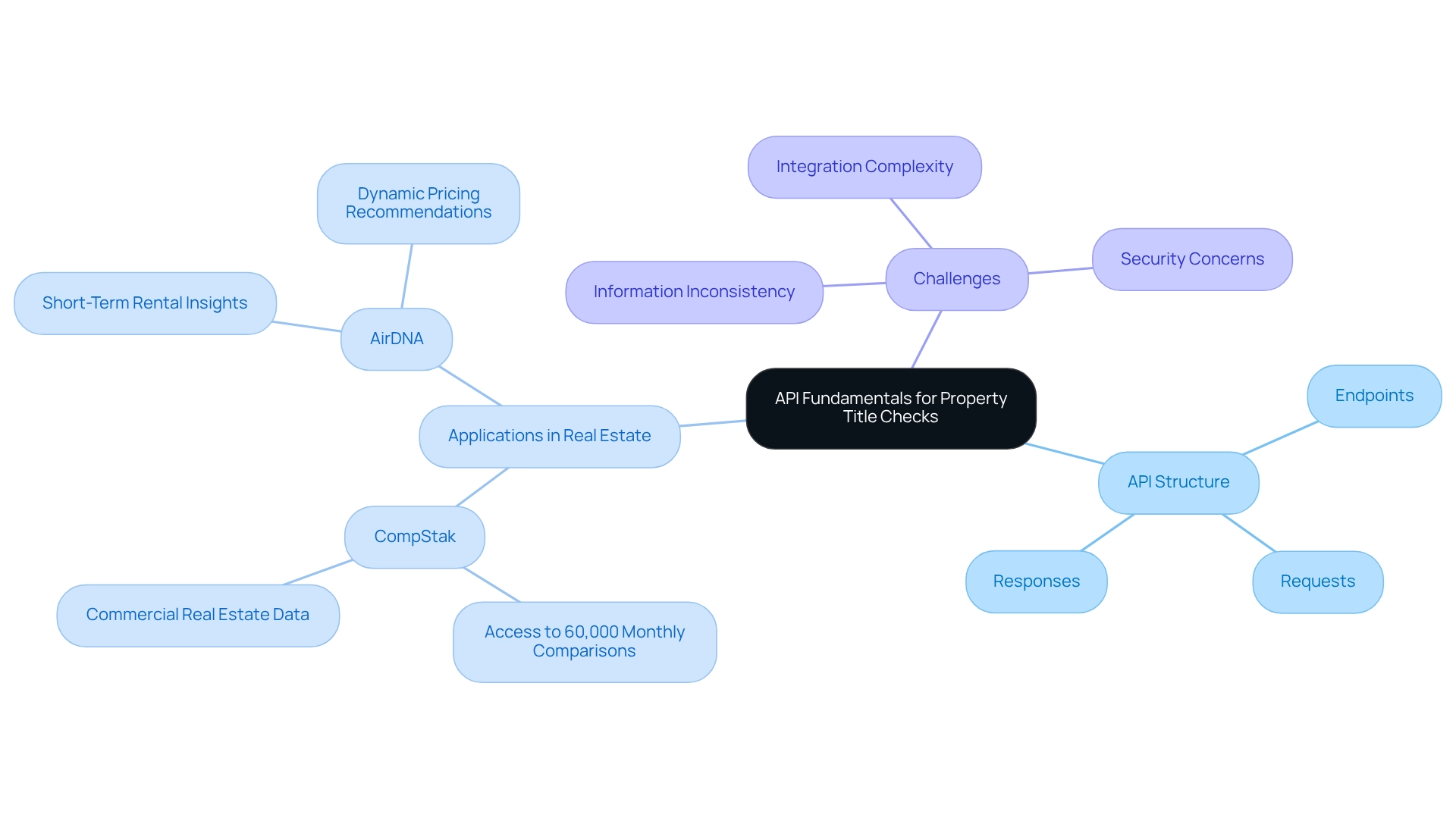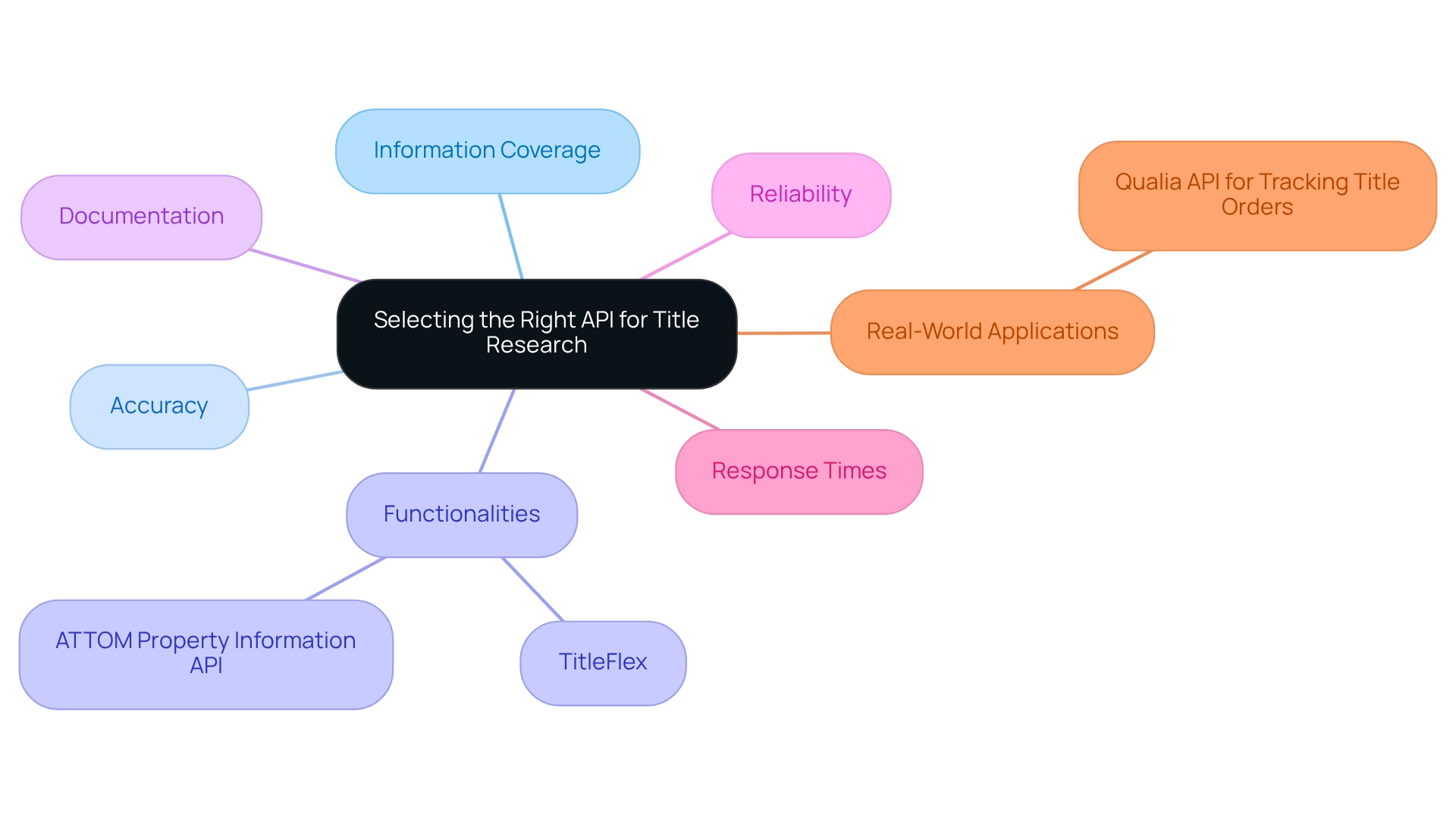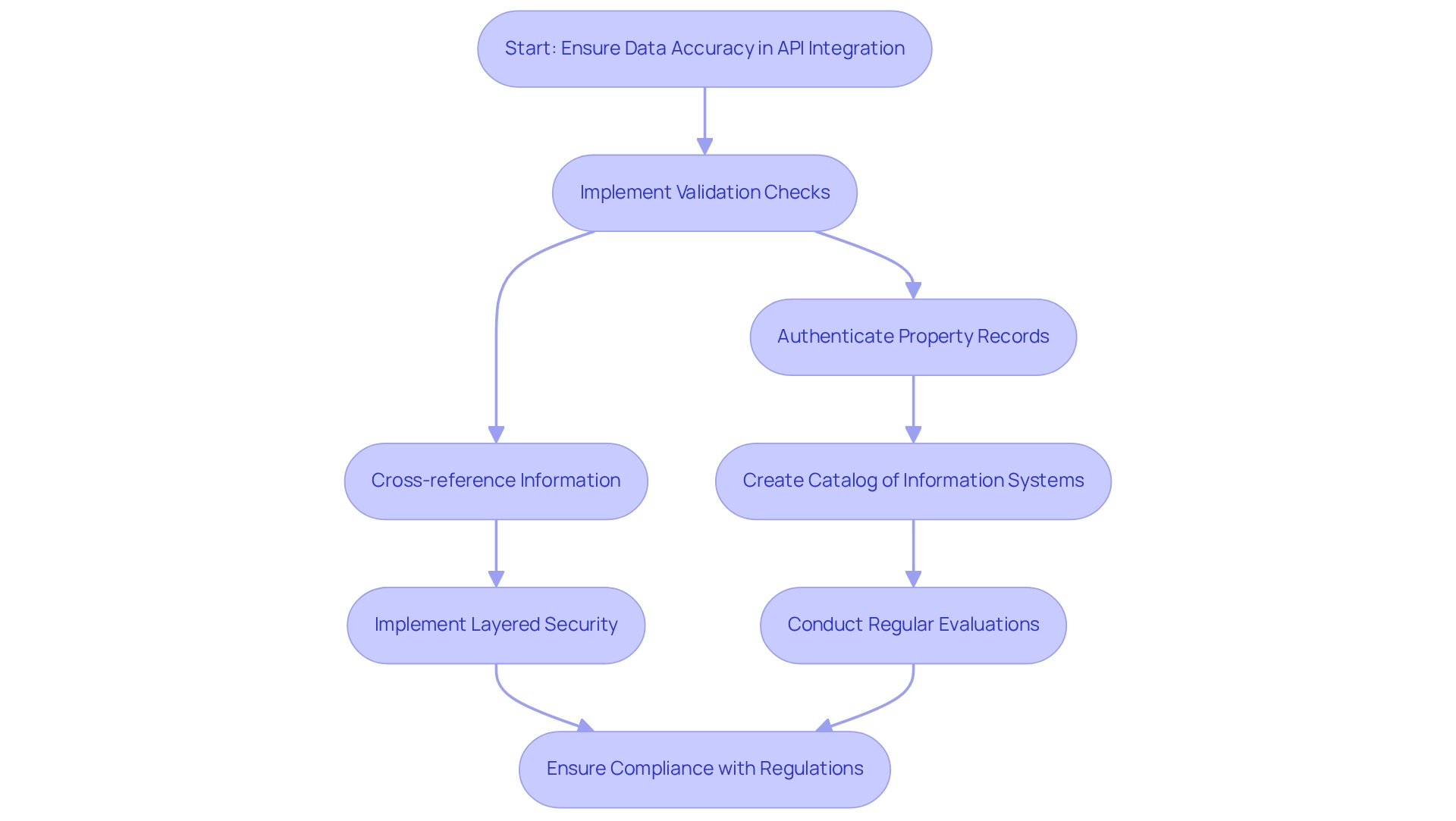Overview
The article explores four strategies for leveraging APIs in property title checks, underscoring their critical role in enhancing efficiency, accuracy, and compliance within property ownership verification processes. It begins by highlighting the significance of precise title research, which is paramount in today's real estate landscape. Furthermore, it emphasizes the necessity of selecting the appropriate API based on coverage and functionality. In addition, the article addresses challenges such as data accuracy and integration complexities, which are essential for maximizing the advantages of API technology in real estate. Ultimately, these strategies not only streamline operations but also bolster the reliability of property title checks.
Introduction
In the rapidly evolving landscape of real estate, the integration of technology has emerged as a game-changer, particularly through the use of Application Programming Interfaces (APIs). These powerful tools serve as bridges between software applications, enabling seamless access to critical property data, including ownership records and legal documents.
As title researchers increasingly depend on APIs to enhance their workflows, understanding the fundamentals and selecting the right solutions become paramount. This article delves into the essential aspects of API integration for property title checks, exploring how it can streamline operations, ensure data accuracy, and ultimately drive efficiency in the title research process.
Furthermore, from navigating common challenges to implementing effective workflows, the insights provided will equip professionals with the knowledge needed to leverage API technology to its fullest potential.
Understand API Fundamentals for Property Title Checks
Application Programming Interfaces, or APIs, serve as essential intermediaries that facilitate communication between various software applications. In the realm of property ownership verifications, an API for property title checks provides immediate access to critical information such as property records, ownership specifics, and legal documents. A comprehensive understanding of API structure—including endpoints, requests, and responses—is vital for maximizing their potential. For instance, an API for property title checks enables property researchers to swiftly access ownership histories and verify property details, significantly reducing the time required for manual searches. Proficiency in RESTful interfaces, which utilize standard HTTP methods, can further enhance the integration process, allowing for effective information retrieval and manipulation.
As the real estate industry increasingly embraces technology, platforms like CompStak exemplify the growing reliance on interface-driven solutions. CompStak offers access to over 60,000 monthly comparisons nationwide, showcasing how APIs enhance operational effectiveness in property research by supplying extensive market information. Similarly, AirDNA utilizes an API for property title checks to provide insights into short-term rental data, illustrating how interface integration can yield and pricing recommendations. Nevertheless, while the benefits of API integration are substantial, it is crucial to acknowledge common challenges. Issues such as information inconsistency, integration complexity, and security concerns may arise during the implementation of APIs in property ownership checks. Proactively addressing these challenges can empower researchers to fully harness the advantages of API technology.

Select the Right API for Title Research Needs
When selecting an API for , it is essential to consider critical factors such as information coverage, accuracy, and the specific functionalities offered. APIs like the ATTOM Property Information API and TitleFlex, as well as the [API for property title checks](https://blog.parseai.co/10-essential-land-data-aggregation-tools-for-title-research-directors), provide extensive access to property records and ownership details, making them noteworthy options.
It is imperative to assess the API's documentation to ensure it meets your technical requirements and accommodates necessary formats. Furthermore, the reliability and response times of the API are crucial, as these elements can significantly affect your workflow efficiency.
Real-world applications, such as utilizing the Qualia API for tracking title orders, exemplify how the right API can streamline operations and enhance productivity.

Ensure Data Accuracy and Compliance in API Integration
To attain precision in API integration, implementing thorough validation checks throughout the information processing stages is essential. This process involves authenticating property records and cross-referencing information from diverse sources to ensure reliability. As emphasized by the Federal Financial Institutions Examination Council (FFIEC) Guidelines, organizations are advised to create a comprehensive catalog of all information systems, including application interfaces, and to implement layered security measures for monitoring and controlling access.
Compliance with local and federal regulations, including privacy laws, is crucial. Employing application interfaces that provide up-to-date ownership details significantly minimizes the risks associated with obsolete or inaccurate information. Furthermore, conducting regular evaluations of the data obtained through application interfaces not only enhances precision but also guarantees adherence to industry standards.
John Natale, Global Content Marketing Manager for Akamai, underscores that one effective method of compliance is to validate the normal and expected behavior of API usage while implementing controls to block suspicious actors from exploiting your systems. Such practices are vital for maintaining operational resilience and safeguarding against potential compliance challenges in the use of the API for property title checks.
Moreover, with over 22,000 financial institutions and in the European Union impacted by DORA's requirements, the role of technology in enhancing operational resilience becomes increasingly significant in today's digital landscape.

Implement Efficient Workflows with API Integration
Incorporating application interfaces into research workflows can dramatically enhance operational efficiency. Begin by mapping your current processes to pinpoint areas where API integration can streamline tasks. For instance, automating property record retrieval with an API for property title checks minimizes manual data entry, significantly reducing the potential for errors. According to recent statistics, organizations that have implemented API integration have seen workflow efficiency improvements of up to 30%. Furthermore, tools like Zapier or custom scripts can facilitate connections between various applications, automating repetitive tasks and freeing up valuable time for your team.
However, it is essential to be aware of common pitfalls, such as inadequate training or failure to adapt existing processes, which can hinder successful implementation. Training staff on effective API usage is crucial to ensure they can fully leverage this technology. As Rita Lazar-Tippe, Chief Digital Officer, noted, "Our loan origination requirements were too custom for , but Feathery was able to meet those standards while allowing us to launch 5x faster than building in house."
Successful case studies from companies that have adopted an API for property title checks in their title research processes illustrate the tangible benefits, such as reduced employee frustration with inefficient processes, providing valuable insights and inspiration for your own implementation.
Conclusion
The integration of APIs into property title checks signifies a transformative shift within the real estate industry, providing unparalleled access to critical property data and enhancing efficiency in title research workflows. By grasping the fundamentals of API technology, title researchers can leverage the power of real-time data retrieval, significantly reducing the time and effort associated with traditional methods. Selecting the right API tailored to specific research needs ensures that professionals can access accurate and comprehensive information, thereby streamlining operations and enhancing productivity.
Data accuracy and compliance stand as non-negotiable elements in the domain of API integration. Implementing stringent validation checks and adhering to regulatory guidelines not only safeguards against potential risks but also bolsters the reliability of the information processed. As the landscape continues to evolve, maintaining a focus on operational resilience through regular audits and security measures will be vital for success.
Ultimately, the adoption of efficient workflows through API integration can yield substantial improvements in operational performance. Automating repetitive tasks and minimizing manual input not only reduces errors but also empowers teams to concentrate on higher-value activities. As the real estate sector embraces technology, effectively leveraging APIs will be key to remaining competitive and driving innovation in property title research. The future is promising for those who adapt to and embrace these technological advancements, paving the way for a more efficient, accurate, and compliant real estate environment.
Frequently Asked Questions
What is the role of APIs in property ownership verifications?
APIs serve as intermediaries that facilitate communication between software applications, providing immediate access to critical information such as property records, ownership specifics, and legal documents for property title checks.
How do APIs improve the process of property title checks?
An API for property title checks allows property researchers to quickly access ownership histories and verify property details, significantly reducing the time required for manual searches.
What is important to understand about API structure?
A comprehensive understanding of API structure—including endpoints, requests, and responses—is vital for maximizing the potential of APIs in property ownership verifications.
What are RESTful interfaces and why are they important?
RESTful interfaces utilize standard HTTP methods and are important because proficiency in them can enhance the integration process, allowing for effective information retrieval and manipulation.
Can you provide examples of platforms that utilize APIs in real estate?
CompStak and AirDNA are examples of platforms that utilize APIs. CompStak offers access to extensive market information with monthly comparisons, while AirDNA uses an API for property title checks to provide insights into short-term rental data.
What challenges may arise with API integration in property ownership checks?
Common challenges include information inconsistency, integration complexity, and security concerns during the implementation of APIs.
How can researchers address challenges associated with API technology?
Proactively addressing challenges such as information inconsistency, integration complexity, and security concerns can empower researchers to fully harness the advantages of API technology.




